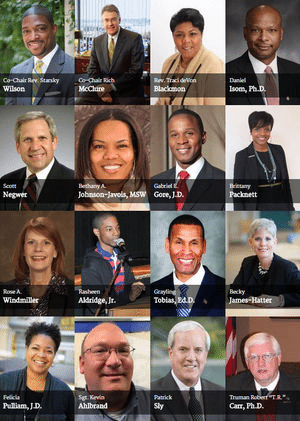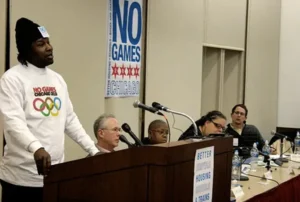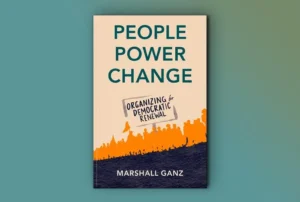November 18, 2014; St. Louis Post-Dispatch
Three hundred people applied to be on the “Ferguson Commission” created by Missouri Governor Jay Nixon to do something—what, exactly, isn’t clear—about the social and economic conditions that have been linked to the killing of unarmed teenager Michael Brown and the subsequent protests against Ferguson’s nearly all-white government and police departments, the militarized police response to the protests, and perhaps the cluelessness of some of the region’s political leaders about the racial tensions occurring under their noses.
Yesterday, Nixon swore in the 16 people he selected for the commission:
Sign up for our free newsletters
Subscribe to NPQ's newsletters to have our top stories delivered directly to your inbox.
By signing up, you agree to our privacy policy and terms of use, and to receive messages from NPQ and our partners.

Source: St. Louis Post-Dispatch
The Post-Dispatch provided the list of members, as well as excerpts from their statements of why they wanted to serve:
- Rev. Starsky Wilson (@ReverendStarsky), co-chair of the commission, president and CEO of the Deaconess Foundation: “The work of this commission aligns with the work of Deaconess Foundation, which I lead, to advance the health of the region and its people through effective alignment of philanthropic, social service and governmental resources and policies.” Rev. Wilson, as readers may remember, was one of a group of national foundation leaders who issued a statement recently to government officials on how to respond to protests in the wake of a grand jury decision.
- Rich McClure, co-chair of the commission, former president of UniGroup, chair of the St. Louis Regional Board of Teach for America: “I am deeply committed to making St. Louis a stronger and fairer place for all”
- Rev. Traci deVon Blackmon, pastor, Christ the King United Church of Christ; coordinator of faith-based initiatives for BJC HealthCare: “I believe in the inherent good of all people and, although there are many systemic and structural challenges that must be addressed, commitment, collaboration, and authentic conversation will lead us toward the Ferguson that some residents experience and other residents only imagine.”
- Daniel Isom, director, Missouri Department of Public Safety, former St. Louis Metropolitan Police Department chief: “As a former police officer, police chief, father, and lifelong resident of this area, I want to make sure we seize this opportunity to make St. Louis a better place for everyone to live and achieve their dreams.”
- Scott Negwer, president, Negwer Material: “I am passionate about enabling those who are disadvantaged to succeed, and I am passionate about the well-being of North County.”
- Bethany A. Johnson-Javois, CEO, St. Louis Integrated Health Network: “Bottom line, it’s time to address the systemic inequities in our municipalities, in our region and in our great state.”
- Gabriel E. Gore, partner, Dowd Bennett: “My hope is that the end result of the events that have led to the recent social unrest in our community will be that we grow stronger and more connected as a community.”
- Brittany N. Packnett (@MsPackyetti), executive director, Teach for America in St. Louis: “Since August 9th, I have worked to intensively listen to the needs of the community, especially our students and young people, to represent their voice and our collective truth through multiple outlets to establish tactical solutions like Teach For Ferguson, and to coordinate peaceful protests to promote the value of our children’s lives.”
- Rose A. Windmiller, assistant vice chancellor, government and community relations at Washington University: “The question we must face is this: are we actively engaged with members of our community who are, by virtue of visible and invisible barriers, less able to take full advantage of the educational, healthcare and economic benefits that many of us accept as standard?”
- Rasheen Aldridge Jr. (@SheenBean32), student, Forest Park Community College; director, Young Activist United St. Louis; student co-chair on Missouri Jobs with Justice: “I want to get to the root of the issues in Ferguson, Shaw and the whole city on why individuals feel like they are targets to the police and the whole system…I work with all different ages, races and religions and understand the importance of how all people work and play together. I hope with the Commission we will be able to solve and come up with real solutions of the problems that are affecting people of all colors and how to make St. Louis a place that people love and feel like they belong in their own city.”
- Grayling Tobias (@GraylingTobias), superintendent, Hazelwood School District: “This situation is more than just about North St. Louis County, it is about improving relations between all races, creeds ethnic and social economic backgrounds.”
- Becky James-Hatter (@BeckJamesHatte), president and CEO, Big Brothers Big Sisters of Eastern Missouri: “(W)ith courage, fair minds and persistence, we can face our region’s toughest challenges, build more trusting relationships and ensure greater opportunities for our children, teens and young adults”
- Felicia Pulliam, Development director, FOCUS, the region’s executive leadership program: “I am not one of the usual participants, whose perspectives and agendas are recycled over and again in nearly every situation.”
- Kevin Ahlbrand, 31-year veteran St. Louis police officer and deputy commander of the Major Case Squad of Greater St. Louis: “I look forward to being part of the process to identify issues and seek solutions which will build trust and bring our communities and law enforcement closer together in our efforts to keep our citizens safe.”
- Patrick Sly, Manager, Emerson Charitable Trust: “I want to join the Ferguson Commission to help support and heal the community and to represent Emerson which has a vested interest in supporting our ‘home town.’”
- T.R. Carr, Professor and former chair of the Department of Public Administration and Policy Analysis at Southern Illinois University Edwardsville, former mayor of Hazelwood: “It is important to effectively communicate with the law enforcement community as strategies are developed for this region. I can help serve as a bridge in this area.”
It may be due to the excerpts chosen for publication by the Post-Dispatch, but the printed statements of the members other than Aldridge, the obviously youngest member of the commission, don’t specifically address race as one of the underlying issues to be understood and confronted. The statements from Windmiller and Johnson-Javois suggest that the inequities that some people in metropolitan St. Louis experience aren’t simply happenstance, but systemic, and both overt and covert in their causes. Their comments also suggest an awareness of the structural racism issues that were reflected in the Ferguson dynamics.
We’ve included in this newswire some of the Twitter handles for members of the commission, which we presume that the Post-Dispatch printed so that its readers could reach out to them with ideas and suggestions. We suggest the same: Tweet these members and tweet NPQ as well (@NPQuarterly) to let them and us know what you think the commission could and should do.—Rick Cohen












